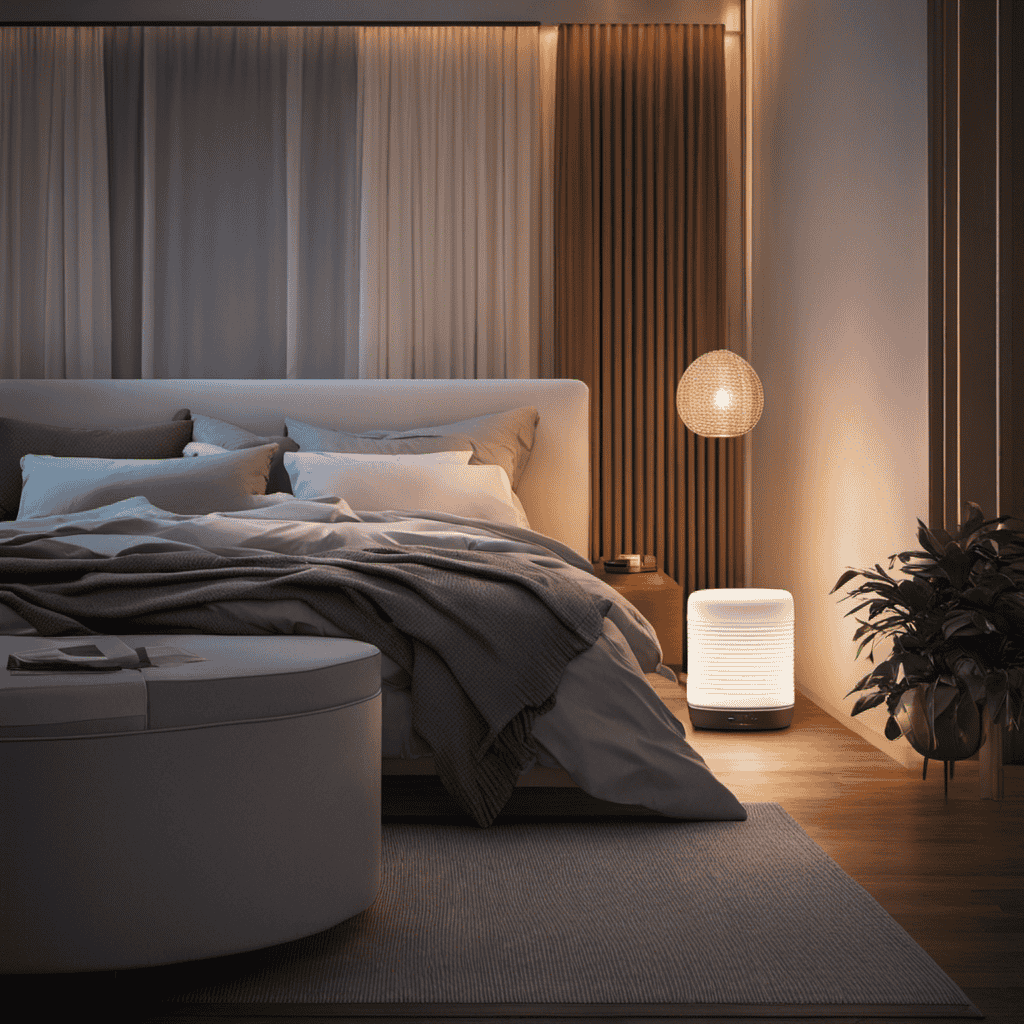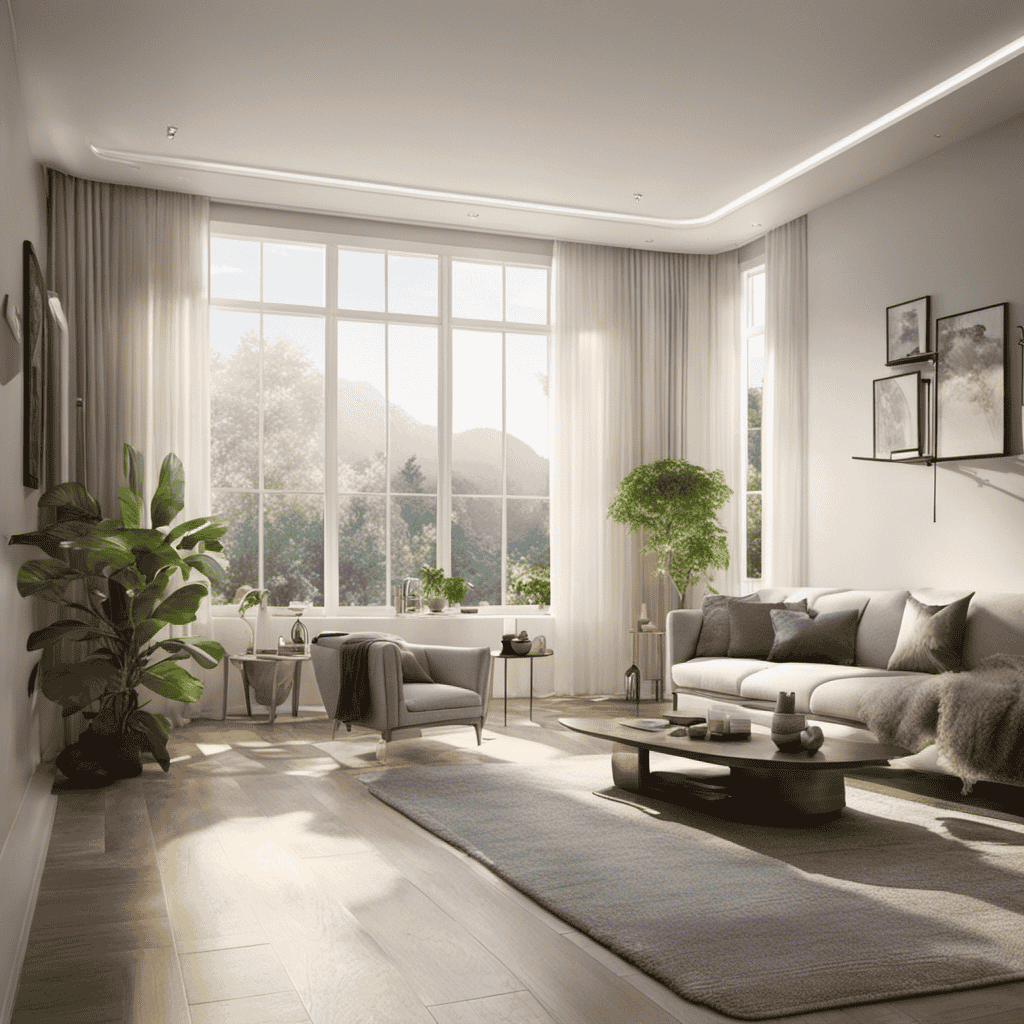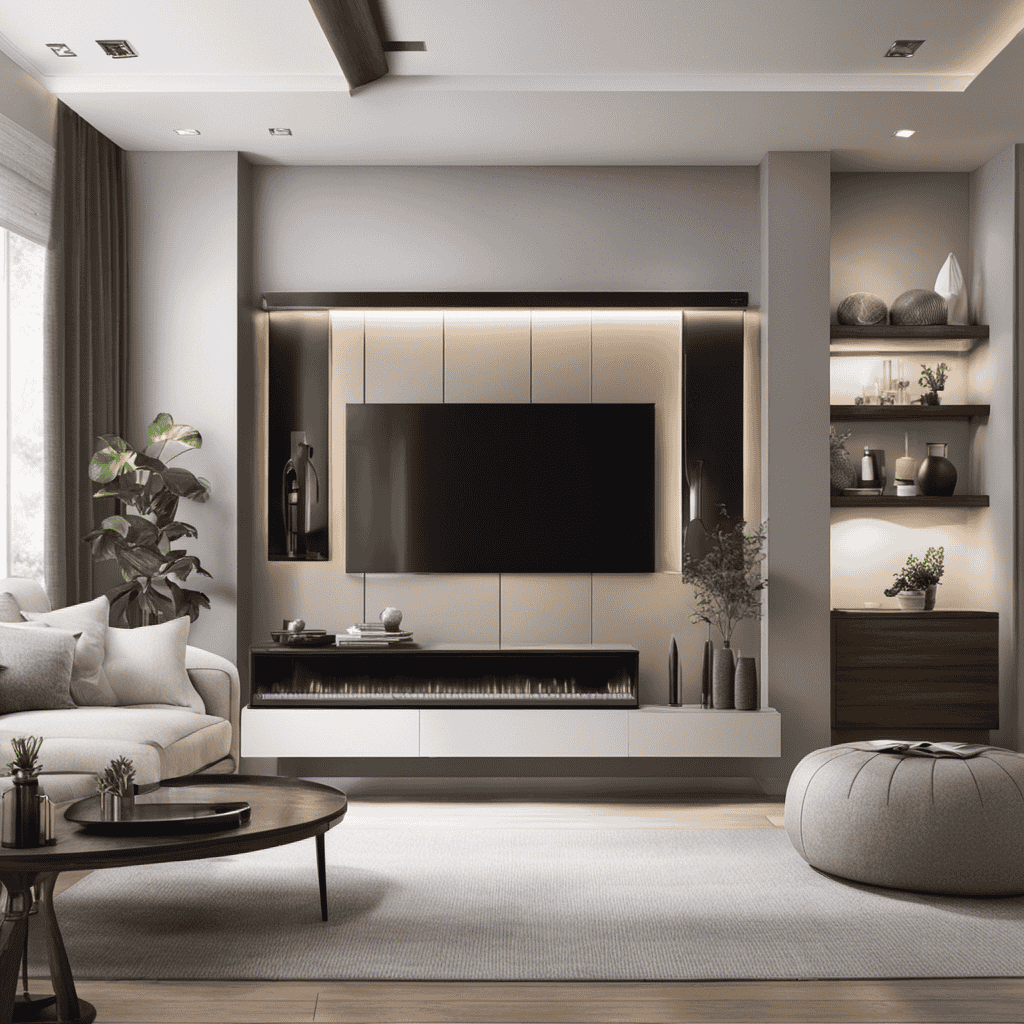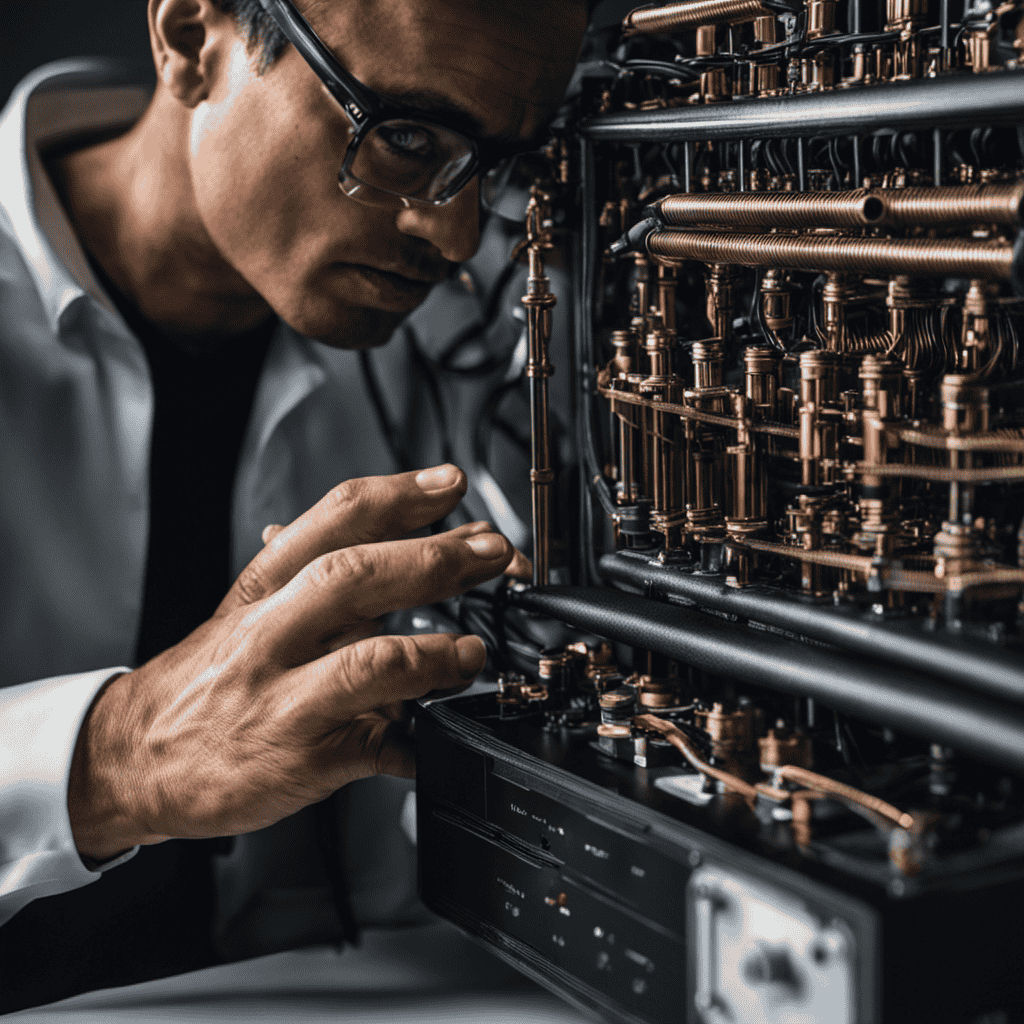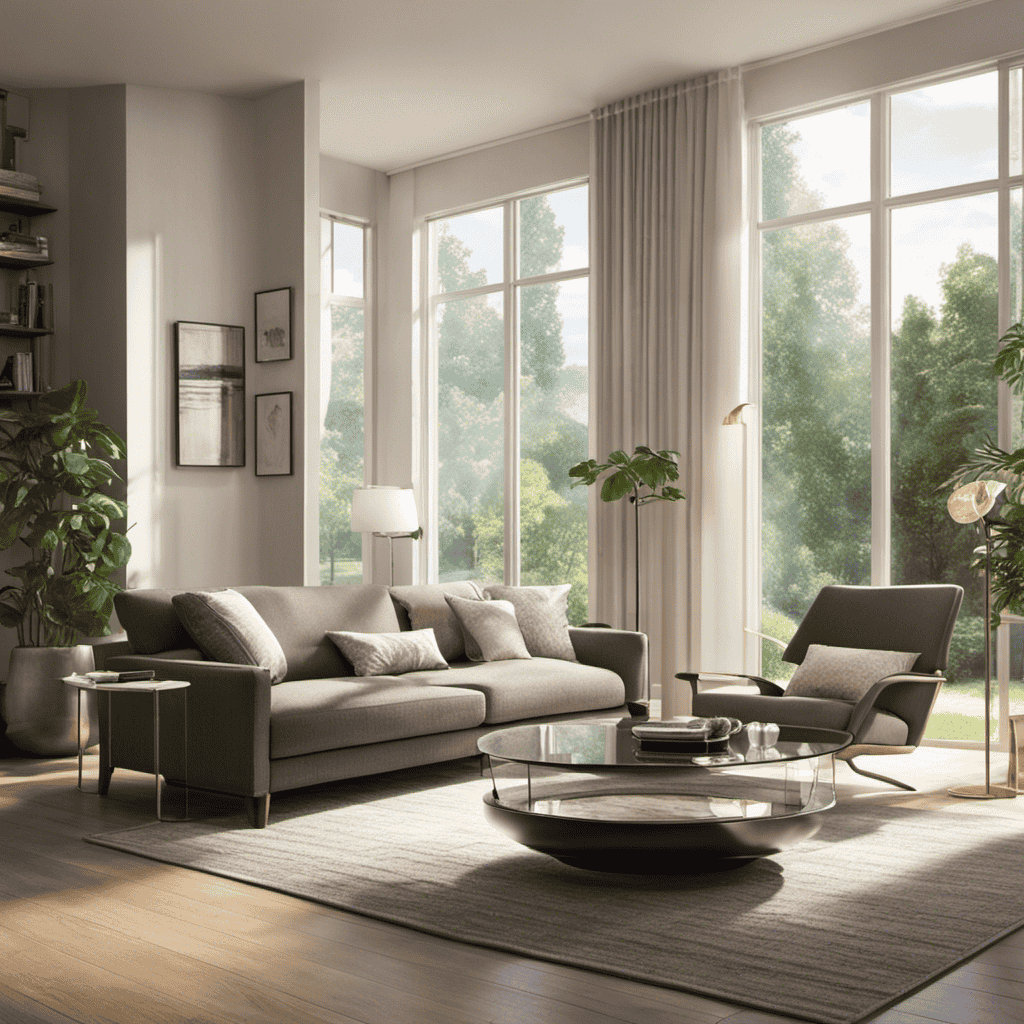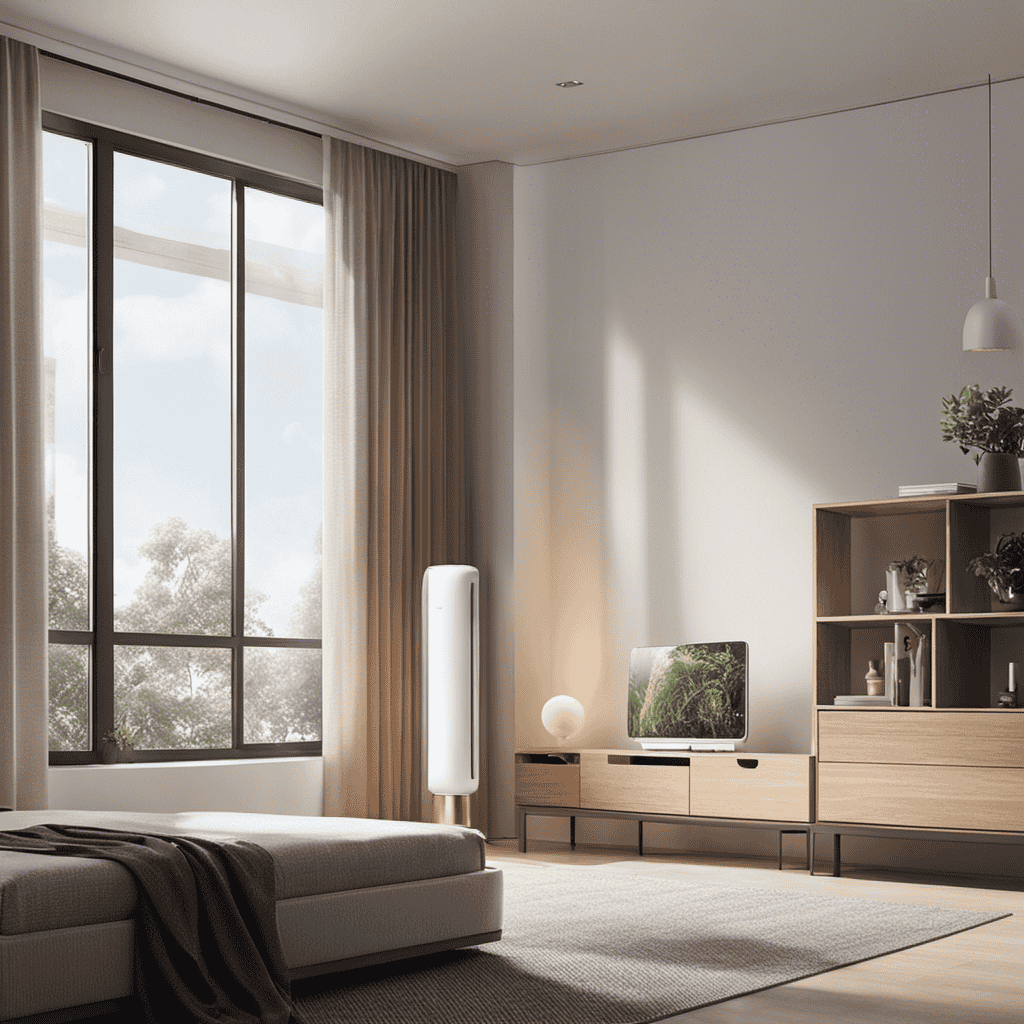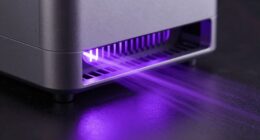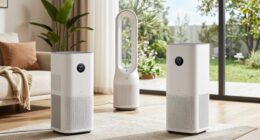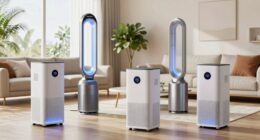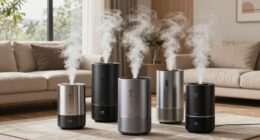When’s the best time to switch on my bedroom HEPA air purifier before bedtime? This common dilemma arises when we all seek a fresh and safe sleep space. Discover the answer to this pressing question that improves your sleep quality and overall health. Benefit from a peaceful night’s rest while breathing in clean, purified air that’s beneficial for your well-being.
In this article, I will delve into the importance of timing, factors to consider, and the ideal time frame to maximize the benefits of your air purifier. By understanding the effects on sleep quality and optimal pre-sleep setup, we can create a balance between energy efficiency and clean air.
Let’s explore the world of air purification and its impact on our well-being.
Key Takeaways
- Turning on the bedroom HEPA air purifier 30 minutes before bedtime improves air quality while sleeping.
- Running the purifier at night enhances the effectiveness of air purification.
- Timing is crucial to maximize the benefits of nighttime purification.
- Activating the purifier a couple of hours before sleep optimizes its performance and benefits, creating a healthier and more comfortable sleep environment.
The Importance of Timing
You should try to turn on the bedroom HEPA air purifier about 30 minutes before you go to sleep. Timing is crucial when it comes to reaping the full benefits of nighttime purification. Research has shown that running the air purifier during the night can improve the quality of the air you breathe while you sleep.
By turning it on 30 minutes before bedtime, you are allowing enough time for the purifier to effectively filter out pollutants, allergens, and other harmful particles from the air in your bedroom. This ensures that you are breathing in clean, fresh air throughout the night, which can lead to better sleep quality and overall health.
Now that you understand the importance of timing, let’s delve into other factors to consider when using a bedroom HEPA air purifier.
Factors to Consider
When considering the optimal time for purification, there are a few key points to take into consideration.
First, it is important to understand that the effectiveness of the air purifier may vary depending on the time of day. Research suggests that running the purifier during the evening and throughout the night may be most beneficial, as this is when indoor air pollution tends to be highest.
Additionally, noise level considerations should also be taken into account. Some individuals may find the noise emitted by the air purifier to be disruptive to their sleep, while others may not be bothered by it. It is important to find a balance between purification effectiveness and noise level to ensure a restful night’s sleep.
Optimal Time for Purification
Ideally, it’s best to turn on the bedroom hepa air purifier a few hours before you plan on going to sleep. This allows the purifier to effectively clean the air in your bedroom, ensuring a healthier and more restful sleep.
Here are three reasons why the optimal purification duration before sleep is crucial:
-
Improved Air Quality: Turning on the air purifier a few hours before bedtime allows it to remove allergens, pollutants, and other harmful particles from the air. This helps create a cleaner and healthier environment for sleeping, reducing the risk of respiratory issues and allergies.
-
Reduced Allergens: Many individuals suffer from allergies that can be triggered by various allergens present in the air. By running the air purifier for an extended period before sleep, you can significantly reduce the number of allergens in the room, leading to reduced allergy symptoms and better sleep quality.
-
Elimination of Odors: Air purifiers are also effective at removing unwanted odors from the bedroom. By running the purifier for a few hours before sleep, you can eliminate any lingering smells, creating a more pleasant and relaxing sleep environment.
Noise Level Considerations
The noise level of the air purifier can impact the quality of your sleep. When evaluating the noise level of an air purifier, it is important to consider the decibel (dB) rating. A noise level evaluation can help determine if the air purifier will be too loud for your bedroom.
Ideally, the noise level should be below 50 dB to ensure a peaceful sleep environment. Additionally, when conducting a bedroom air quality assessment, it is crucial to take into account the noise level as it can affect your overall sleep quality. High noise levels can disrupt your sleep patterns and lead to sleep disturbances.
Therefore, it is recommended to choose an air purifier with a low noise level to ensure a restful night’s sleep.
Ideal Time Frame
For optimal results, it’s best to turn on the bedroom HEPA air purifier a few hours before going to sleep. Here’s why:
-
Eliminating airborne pollutants: By turning on the HEPA air purifier a few hours before bedtime, it allows enough time for the device to filter and purify the air in your bedroom. This helps to remove allergens, dust, pet dander, and other pollutants that can disrupt your sleep.
-
Creating an ideal sleep environment: A clean and fresh sleep environment is essential for a good night’s rest. By starting the air purifier early, you can ensure that the air in your bedroom is clean, reducing the risk of respiratory issues and promoting better sleep quality.
-
Allowing for noise reduction: Some air purifiers can produce a low level of white noise, which can be soothing and help mask other disruptive sounds. By starting the air purifier a few hours before sleep, you can enjoy the noise reduction benefits without it being too loud or distracting during the night.
Effects on Sleep Quality
After conducting research on the optimal activation time for air purifiers and its effects on sleep quality, I’ve found that turning on the purifier approximately 30 minutes before going to bed is recommended. This allows enough time for the purifier to filter the air and remove any pollutants or allergens that could potentially disrupt sleep.
Additionally, studies have shown that using an air purifier in the bedroom can significantly reduce sleep disturbances caused by indoor air pollution, leading to improved sleep quality and overall well-being.
Optimal Purifier Activation Time
Ideally, you should turn on the bedroom HEPA air purifier a couple of hours before going to sleep. This timing ensures optimal purifier activation and maximizes its effectiveness in improving the air quality in your bedroom. Here are three reasons why activating your purifier in advance is beneficial:
-
Allergens Removal: By turning on the purifier a couple of hours before bed, it has more time to filter and capture allergens like dust, pollen, and pet dander from the air. This helps reduce their concentration, creating a cleaner sleeping environment.
-
Odor Elimination: Activating the purifier earlier allows it to effectively remove unpleasant odors from your bedroom. Whether it’s cooking smells, pet odors, or smoke, the purifier can efficiently eliminate these odors, ensuring a fresh and clean atmosphere for a restful sleep.
-
Noise Reduction: Some air purifiers can produce a low-level white noise. By turning it on earlier, you give yourself time to adjust to the sound, making it easier to fall asleep. Additionally, running the purifier for a longer period can help drown out other disruptive noises, enhancing your sleep quality.
Overall, activating your bedroom HEPA air purifier a couple of hours before bedtime optimizes its performance and benefits, promoting a healthier and more comfortable sleep environment.
Sleep Disturbances and Purifier
Using a purifier during sleep can help reduce sleep disturbances caused by allergens and odors. When it comes to timing considerations, it is best to turn on the bedroom HEPA air purifier about 30 minutes before going to sleep. This allows the purifier enough time to filter the air and create a clean sleep environment.
Research has shown that using a purifier during sleep can significantly improve air quality, leading to better sleep quality and fewer disruptions during the night. By removing allergens and odors from the air, the purifier creates a more comfortable sleep environment, reducing the risk of allergic reactions and potential sleep disturbances.
Optimal Pre-Sleep Setup
To create an optimal pre-sleep setup, it’s important to turn on the bedroom HEPA air purifier at least 30 minutes before going to sleep. Timing considerations and purifier placement play a crucial role in maximizing the benefits of your air purifier. Here are three key factors to keep in mind:
-
Timing considerations: Turning on the air purifier 30 minutes before bedtime allows it to effectively filter and circulate the air in your bedroom. This timeframe gives the purifier enough time to remove any pollutants, allergens, or odors that may affect your sleep quality.
-
Purifier placement: Positioning the air purifier in the right spot is essential for optimal performance. Place it near the bed or on a bedside table, ensuring that it can efficiently clean the air around you while you sleep. Avoid placing it too close to walls or furniture, as it may obstruct airflow and reduce its effectiveness.
-
Maintenance and filter replacement: Regularly clean and maintain your air purifier to ensure its continued efficiency. Be mindful of the manufacturer’s instructions for filter replacement to maintain its performance and keep your bedroom air clean and fresh.
Adjusting for Allergies or Asthma
If you suffer from allergies or asthma, it’s important to consider adjusting your pre-sleep setup for optimal comfort and breathing.
One key aspect to consider is adjusting your medication. Make sure you are taking the appropriate medications as prescribed by your healthcare provider. This may include inhalers, antihistamines, or nasal sprays to help manage your symptoms.
Additionally, it’s worth exploring alternative remedies that may help alleviate your allergies or asthma. Some people find relief through natural remedies such as using essential oils, practicing breathing exercises, or trying acupuncture. However, it’s crucial to consult with your healthcare provider before incorporating any alternative remedies into your routine.
Balancing Energy Efficiency and Clean Air
When it comes to balancing energy efficiency and clean air, it’s important to regularly clean and maintain your HVAC system. By doing so, you can ensure that your system is running efficiently and effectively, while also providing you with the cleanest air possible.
Here are three key factors to consider when trying to find the right balance between energy efficiency and clean air:
-
Energy Saving Features: Look for HVAC systems that offer energy-saving features such as programmable thermostats and variable speed motors. These features can help reduce energy consumption while maintaining optimal comfort levels.
-
Air Quality Standards: Make sure your HVAC system meets or exceeds air quality standards set by organizations such as the Environmental Protection Agency (EPA). Look for systems with high-efficiency air filters and UV germicidal lights to help improve indoor air quality.
-
Regular Maintenance: Schedule regular inspections and maintenance for your HVAC system to ensure it is operating at peak efficiency. This includes cleaning or replacing air filters, checking for leaks or blockages, and optimizing airflow.
Troubleshooting and Common Mistakes
Now that we’ve discussed balancing energy efficiency and clean air in the previous subtopic, let’s move on to troubleshooting and common mistakes when using a bedroom HEPA air purifier.
Timing and effectiveness are crucial factors to consider when using an air purifier. To maximize its efficiency, it’s recommended to turn on the air purifier a few hours before going to sleep. This allows enough time for the purifier to clean the air in the room and create a fresh sleeping environment.
However, there are some common mistakes that can hinder the performance of your air purifier. One of the most common mistakes is forgetting to clean or replace the filters regularly. Dirty filters can reduce the effectiveness of the purifier and allow pollutants to recirculate in the room.
Another mistake is placing the air purifier in the wrong location. It’s important to keep the purifier away from walls and furniture, allowing for proper airflow. Additionally, make sure the purifier is the correct size for the room to ensure optimal performance.
Conclusion
In conclusion, timing is crucial when it comes to turning on your bedroom HEPA air purifier before going to sleep. By considering factors such as room size, air quality, and personal health conditions, you can determine the ideal time frame for optimal sleep quality.
It is important to find the right balance between energy efficiency and clean air, ensuring that you are not sacrificing one for the other. By following these guidelines and avoiding common mistakes, you can create a pre-sleep setup that promotes a restful night’s sleep.
As the saying goes, ‘A breath of fresh air can work wonders.’
